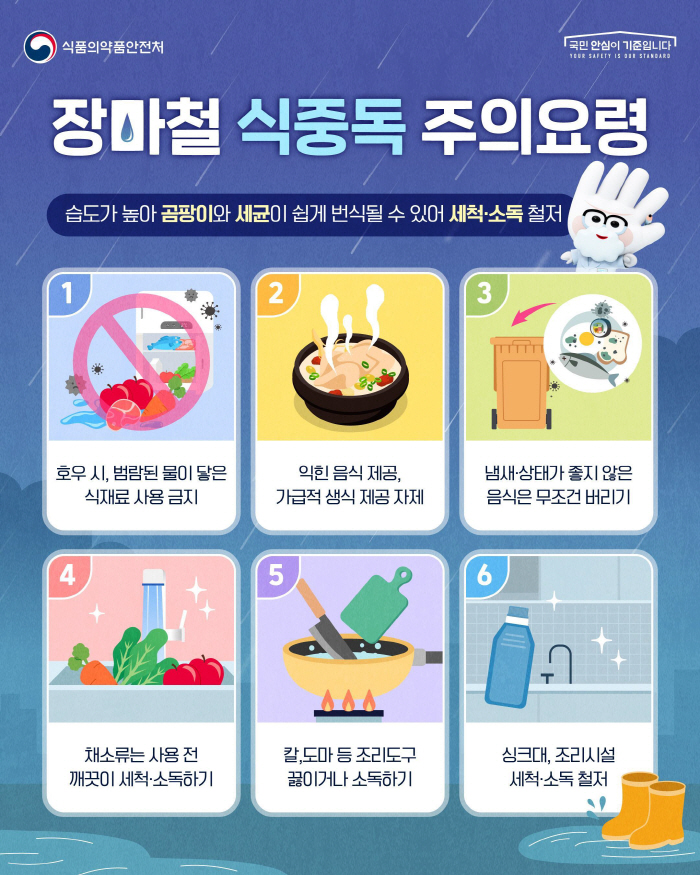Food flooded by torrential rain, food poisoning risks high...We need to dispose of it immediately
As the risk of food poisoning increases during the period of high and humid torrential rain, the Ministry of Food and Drug Safety urged special attention to handling food ingredients and personal hygiene management.
If the temperature and humidity increase after torrential rain, it becomes an environment where fungi and bacteria can multiply easily. In addition, if sewage and rivers overflow due to torrential rain, livestock manure or compost may leak out and contaminate groundwater or crops, resulting in food poisoning, so thorough food and personal hygiene management are required.
First of all, food that has been in contact with, or is suspected of being in contact with, or in contact with, flooded water due to torrential rain should be disposed of immediately without using or consuming it. If it is difficult to operate the refrigerator due to a power failure, do not open the refrigerator door frequently to keep it refrigerated and frozen as much as possible, and dispose of food that may deteriorate due to a long-term power failure.
In addition, peanuts and nuts that are prone to mold due to moisture should be sealed and refrigerated and frozen as much as possible, and dry agricultural products such as grains and beans should be sealed well and stored in a dry place. Fruits such as watermelon, melon, and peach are recommended to be consumed after washing the surface cleanly using a cleaning agent for fruits and vegetables, rinsing well with tap water.
Vegetables consumed without heat cooking, such as salads and seasoned raw vegetables, should be soaked in chlorine disinfectant (food additives, 100 ppm) for at least 5 minutes and then sufficiently washed with tap water at least 3 times. It is desirable to eat washed vegetables as soon as possible or cook them with vegetables or stir-fry.
On the other hand, if groundwater such as mineral water is used due to difficulty in using tap water, it must be boiled and used, and if a groundwater sterilization and disinfection device is installed, it should be checked that it works normally.
If the temperature and humidity increase after torrential rain, it becomes an environment where fungi and bacteria can multiply easily. In addition, if sewage and rivers overflow due to torrential rain, livestock manure or compost may leak out and contaminate groundwater or crops, resulting in food poisoning, so thorough food and personal hygiene management are required.
First of all, food that has been in contact with, or is suspected of being in contact with, or in contact with, flooded water due to torrential rain should be disposed of immediately without using or consuming it. If it is difficult to operate the refrigerator due to a power failure, do not open the refrigerator door frequently to keep it refrigerated and frozen as much as possible, and dispose of food that may deteriorate due to a long-term power failure.
In addition, peanuts and nuts that are prone to mold due to moisture should be sealed and refrigerated and frozen as much as possible, and dry agricultural products such as grains and beans should be sealed well and stored in a dry place. Fruits such as watermelon, melon, and peach are recommended to be consumed after washing the surface cleanly using a cleaning agent for fruits and vegetables, rinsing well with tap water.
Vegetables consumed without heat cooking, such as salads and seasoned raw vegetables, should be soaked in chlorine disinfectant (food additives, 100 ppm) for at least 5 minutes and then sufficiently washed with tap water at least 3 times. It is desirable to eat washed vegetables as soon as possible or cook them with vegetables or stir-fry.
On the other hand, if groundwater such as mineral water is used due to difficulty in using tap water, it must be boiled and used, and if a groundwater sterilization and disinfection device is installed, it should be checked that it works normally.
|
This article was translated by Naver AI translator.




